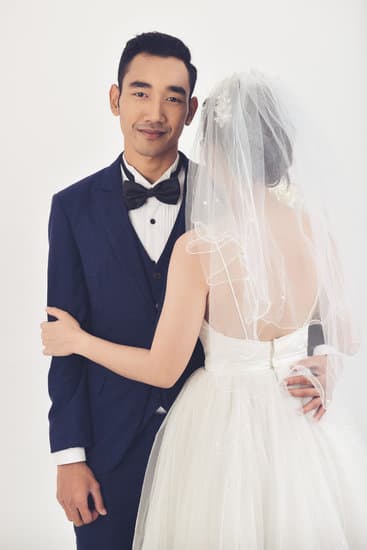The wedding ring is a symbol of eternal love and commitment, but have you ever wondered which finger the wedding ring should be worn on? This article will delve into the history, cultural significance, traditional placement, and modern trends of wedding ring placement to help you make an informed decision about where to wear your wedding ring.
The choice of which finger to wear your wedding ring on is not just a matter of personal preference; it carries deep symbolism and meaning that has evolved over centuries.
The history of wedding rings dates back to ancient Egypt, where the circle was a symbol of eternity and the space in the center represented a gateway to a future unknown. From there, the tradition of wearing wedding rings spread across cultures and societies, each adding its own unique customs and beliefs surrounding this timeless piece of jewelry. Understanding this rich history can provide insight into why we place such importance on which finger to wear our wedding rings.
Beyond historical perspectives, different cultures hold varying views on how wedding rings should be worn. Traditional placement often follows certain customs and beliefs that have been passed down through generations. However, with changing times and globalization, modern trends in wedding ring placement have emerged that offer alternative options for couples looking to break from tradition. Understanding these shifts in societal norms can help couples make an informed decision about where to place their own wedding rings.
Cultural Significance of Wedding Rings
Wedding rings have been a symbol of love and commitment for centuries, with a deep cultural significance across different societies and traditions. The exchange of wedding rings dates back to ancient Egypt, where they were believed to symbolize eternity and the unending cycle of life.
In Roman times, the ring was placed on the fourth finger of the left hand, as it was thought to have a direct vein that led straight to the heart, a notion that has transcended time and is still widely believed today.
In many cultures, the act of placing a wedding ring on each other’s fingers during the marriage ceremony signifies the couple’s mutual promise to love and cherish each other for eternity. It serves as a tangible representation of their commitment and unity as they begin their journey together as spouses. The circular shape of the ring also holds special significance, representing never-ending love and the eternal bond between two individuals.
The wearing of wedding rings on specific fingers also varies across different cultures. For example, in some Asian countries, it is customary for couples to wear their wedding rings on their right-hand ring finger. Meanwhile, in Western cultures, particularly in the United States and Europe, the left-hand ring finger is traditionally chosen for both engagement and wedding rings. These cultural differences add a layer of diversity and individuality to the symbolism behind wedding ring placement.
Traditional Placement of Wedding Rings
The tradition of wearing wedding rings dates back to ancient Egypt, where couples exchanged rings made from materials such as hemp and reeds. This practice symbolized eternal love and commitment, with the circular shape representing never-ending unity.
Later, in ancient Rome, the placement of the wedding ring on the fourth finger of the left hand became popular due to the belief in the “vena amoris” or “vein of love” that was thought to run directly from this finger to the heart.
Cultural Significance
The traditional placement of wedding rings on the left-hand fourth finger has deep cultural significance in many parts of the world. In Western cultures, it is known as the “ring finger” on the left hand, while in Eastern European countries such as Russia and Bulgaria, it is common for wedding rings to be worn on the right hand.
Some cultures even have specific traditions for which family member should present and place the ring on which finger during a wedding ceremony.
Impact of Tradition
This traditional placement continues to hold strong sentimental value for many couples, as it connects them to their heritage and cultural practices. The symbolism attached to this placement serves as a reminder of love that transcends time and space. Additionally, adhering to this customary practice can also serve as a source of comfort and familiarity amidst the numerous changes that come with marriage.
Modern Trends in Wedding Ring Placement
In recent years, there has been a shift in the traditional placement of wedding rings. Modern couples are increasingly seeking alternative ways to wear their wedding rings, breaking away from the conventional norms. This trend reflects changing attitudes towards marriage and personal expression, as individuals seek to make their wedding ring placement more meaningful to them.
Stacking Rings
One popular modern trend in wedding ring placement is the practice of stacking rings. This involves wearing both the engagement ring and wedding band on the same finger, creating a layered and stylish look. Stacking rings allows for more creativity and customization, as couples can mix and match different metals, stones, and designs to create a truly unique combination.
Wearing on Different Fingers
Another modern trend is the choice to wear the wedding ring on a different finger altogether. Some individuals opt to wear their wedding ring on their index or middle finger instead of the traditional ring finger. This non-traditional placement can symbolize independence and individuality, while also making a fashion statement.
Tattooed Wedding Rings
For those who want to completely eschew traditional jewelry, tattooed wedding rings have emerged as a modern alternative. Couples choose to have each other’s initials or symbolic designs tattooed on their ring fingers as a permanent and deeply personal expression of commitment. Tattooed wedding rings have gained popularity for their uniqueness and long-lasting nature.
As society continues to evolve, so do trends in wedding ring placement. Modern couples are embracing these evolving trends as a way to infuse their own personalities into one of the most enduring symbols of love and commitment – their wedding rings.
Symbolism of Each Finger for Wedding Rings
The choice of which finger to wear a wedding ring on has significant symbolism in various cultures and traditions. In Western culture, the ring finger on the left hand is the traditional placement for a wedding ring. This tradition dates back to ancient Rome, where it was believed that the vein in the left ring finger, known as the “vena amoris” or vein of love, was directly connected to the heart.
In other cultures, such as those in India and Indonesia, it is common for brides to wear their wedding rings on the third finger of their right hand. This is based on traditional beliefs in these regions regarding the significance of specific fingers and their connection to different aspects of life, such as love, health, and prosperity.
Furthermore, some modern couples choose to forego tradition altogether by opting for non-traditional placements for their wedding rings. This may include wearing them on a necklace chain around the neck, or even getting matching tattoos as an alternative symbol of their commitment to each other.
Overall, there are various meanings attached to different fingers for wearing wedding rings. Understanding these cultural and symbolic significances can help couples make informed decisions about which finger they would like to wear their wedding rings on.
| Wedding Ring Finger | Symbolism |
|---|---|
| Left Ring Finger | Traditional symbol of love and commitment in Western culture |
| Right Third Finger (India and Indonesia) | Spiritual significance related to love and connection |
| Necklace Chain or Tattoos | Alternative symbols of commitment outside traditional ring placement |
Religious and Superstitious Beliefs Regarding Wedding Ring Finger
When it comes to the wedding ring finger, there are a variety of religious and superstitious beliefs from different cultures that influence where the wedding ring is worn. Here are some common beliefs regarding the wedding ring finger:
- In many Western cultures, it is traditional for the wedding ring to be worn on the fourth finger of the left hand. This tradition dates back to ancient Roman times when it was believed that there was a vein in this finger, referred to as the “vena amoris” or “vein of love,” that was directly connected to the heart.
- In some Eastern European and Asian cultures, however, the right hand is favored for wearing the wedding ring. For example, in Russia and India, couples typically wear their wedding rings on their right hands. This tradition stems from religious beliefs and cultural practices that differ from those in Western societies.
- Superstitions also play a role in determining which finger a wedding ring should be worn on. For instance, in some cultures, it is considered bad luck to wear a wedding ring on the wrong finger. This belief has led to specific guidelines being followed when it comes to choosing the correct finger for a wedding ring.
Understanding these varying religious and superstitious beliefs can help couples make an informed decision about which finger to place their wedding rings on. It’s important for individuals to consider these traditions and customs when choosing how they want to wear their symbol of commitment and love.
How to Choose the Right Finger for Your Wedding Ring
The choice of which finger to wear a wedding ring on is a decision that many couples put a lot of thought into. Traditionally, the wedding ring is worn on the fourth finger of the left hand, also known as the “ring finger.” This practice dates back centuries and has cultural significance in many parts of the world. However, modern trends and personal preferences have led to alternative options for wearing wedding rings.
When choosing the right finger for your wedding ring, it’s important to consider factors such as tradition, culture, personal style, comfort, and practicality. The most common choices for wearing a wedding ring are the fourth finger of the left hand, fourth finger of the right hand, and even the middle finger or thumb. Each option has its own symbolism and meaning, so it’s essential to think about what resonates with you as a couple.
For many people, choosing which finger to wear their wedding ring on is an opportunity to express their individuality and break away from tradition. Some couples opt to wear their rings on different fingers as a way to symbolize their unique bond and love story. Whether following tradition or embracing creativity, selecting the right finger for your wedding ring is a personal decision that should reflect your values and relationship dynamic.
| Wedding Ring Finger Option | Symbolism/Meaning |
|---|---|
| Fourth Finger of Left Hand | Tradition/Cultural Significance |
| Fourth Finger of Right Hand | Alternative/Rethinking Tradition |
| Middle Finger or Thumb | Expressing Individuality/Creativity |
Unique Ideas for Alternative Wedding Ring Placements
When it comes to wedding ring placement, many couples are choosing alternative options that go beyond the traditional ring finger. Here are some unique ideas for alternative wedding ring placements:
1. Necklace: One popular alternative to wearing a wedding ring on the finger is to wear it as a necklace. This can be a meaningful and stylish way to keep your wedding ring close to your heart at all times.
2. Bracelet: Some couples opt to wear their wedding rings on a bracelet instead of their fingers. This can be a practical choice for individuals who work with their hands or have occupations that make wearing a traditional ring difficult.
3. Ankle: For those looking for a truly unique placement, wearing the wedding ring on the ankle is an option worth considering. This unconventional placement can hold special significance for some couples and can also serve as a discreet way of wearing the ring.
Ultimately, the decision of where to wear your wedding ring is a personal one and should reflect your individual style and preferences. Consider these alternative placements as you explore different ways to symbolize your commitment to your partner beyond the traditional finger placement.
Keep in mind that while alternative wedding ring placements can be creative and meaningful, they may come with their own set of pros and cons. Take time to weigh these factors before making a decision on where you want to wear your wedding ring.
The Pros and Cons of Each Wedding Ring Finger Option
In conclusion, the decision of which finger to wear your wedding ring on is a personal one that can be influenced by tradition, culture, religion, and individual preference. The history and cultural significance of wedding rings have shaped the traditional placement of the ring on the fourth finger of the left hand. However, modern trends and individual creativity have led to alternative options for wearing wedding rings on different fingers.
While tradition may dictate the placement of the wedding ring, it is important to consider what feels most comfortable and meaningful to you as an individual. Each finger holds its own symbolism and significance, and choosing the right finger for your wedding ring should be a reflection of your personal values and beliefs.
Ultimately, whether you choose to stick with tradition or explore unique ideas for alternative wedding ring placements, it’s important to remember that there are no strict rules when it comes to wearing your wedding ring. Whichever option you choose, what matters most is the love and commitment that the ring represents in your relationship.
Frequently Asked Questions
Is It OK to Wear Wedding Ring on Right Hand?
Yes, it is okay to wear a wedding ring on the right hand. In many countries and cultures, wearing the wedding ring on the right hand is perfectly acceptable and even the norm. It ultimately depends on personal preference and cultural traditions.
Which Finger Do Italians Wear Wedding Ring?
In Italy, the tradition is to wear the wedding ring on the fourth finger of the left hand. This is because it is believed that this finger has a vein that leads directly to the heart, symbolizing love and commitment in marriage.
Where Should Wedding Ring Be Left or Right?
Traditionally, in many Western cultures, including the United States, the wedding ring is worn on the fourth finger of the left hand. This tradition stems from ancient beliefs about a “vein of love” running directly from this finger to the heart.
However, in some cultures and modern times, wearing the wedding ring on the right hand has also become more common and accepted. Ultimately, where to wear a wedding ring is a personal choice or may be influenced by cultural traditions.

I have been involved in marriages for over 20 years helping couples and singles understand more about them.





